44th All Japan Russian Fighters' interviews - Block C & D
- 2012-11-01
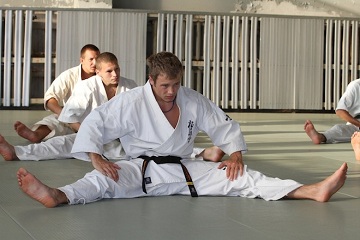
Q: How many tournaments have you had for the year 2011-2012?
A: I had nine tournaments.
Q: How many in open weight and how many in heavy weight category?
A: Two in open weight and one in -90 kg.
Q: How do your fight usually end when you win?
A: My fight ends most likely with Wazari/Ippon or by decision in overtime.
Q: Tell me how you came across Kyokushin?
A: I used to play football. One day at the school, One Sensei of Kyokushin gave out leaflets and I decided to try. So far I'm still trying.
Q: Who is your most important supporters?
A: My family and teammates.
Q: Who are your main competitors in the Block C at the upcoming 44th All Japan Tournament?
A: Kyouhei Ajima, Alexey Medvedev and Alejandro Navarro.
#76 Sergei Uvitckii
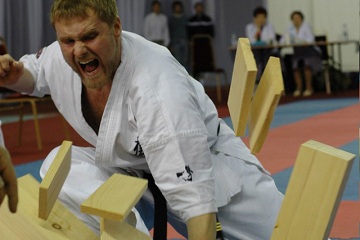
Q: Recently, we watch fighters who fight on the edge of the rules. Do you have any comment on it?
A: I just try to fight fairly and hard.
Q: The draw has been published. Against whom have you fought before?
A: I had fought against Shoki Arata, Goderzi Kapanadze, Darmen Sdovokasov, Djema Belkhodja.
#80 Alexey Medvedev
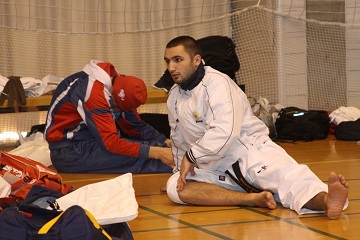
Q: How many years have you been in Kyokushin?
A: I have been doing Kyokushin for 14 years.
Q: When did you start preparing and who is helping you?
A: I started in July and all my family and friends gave me support, the coach and gym sets up my training. I thank them very much.
Q: Who do you think is your main rival in Block C?
A: I never single out anyone. I am sure that I need to reckon every opponent. Everyone with whom I will meet is main competitor.
Q: Do you train specifically for Tameshiwari?
A: Yes, certainly. I strengthen my hands and legs for Tameshiwari.
#88 David Sarkhoshyan
Q: At what age did you start Kyokushin and
fighting in the tournament?
A: I started training at age 3 and fighting at 7.
Q: You are 17 years old now, and this is your second adult tournament in Japan. How many tournaments have you experienced in the adult division?
A: I already experienced 10 adult tournaments, among them are All Armenian in NY and All Japan Weight Category in Osaka.
Q: Do you remember your first fight in the adult tournament?
A: Yes, I was 16 and the fight was a success. At first, it was hard to move from junior category to adult but I got used to after.
Q: You are tall and have fast knee kick. How many opponents in a tournaments have you knocked out with this technique?
A: I don't remember but have many.
Q: Who trains you and how is your preparation going for the All Japan?
A: Sensei Karen Gyadukyan and Anastasia Khripunova is training me and preparation is coming good as usual.
Q: How many tournaments have you participated in Japan?
A: Five times in all - four times in the International Friendship, 1st Place in 2010 and 2012 and one time in the All Japan Weight Category.
#97 Darmen Sadvokasov
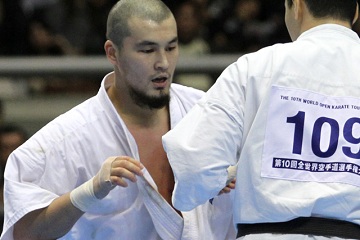
Q: Many people felt that you did not show all of what you've got at the 10th World Open Tournament in 2011. What happened? Did the long break have any influence?
A: Yes, the break left its mark, I gained a little weight and as a result reduced my efficiency.
Q: After the World Tournament you won a weight category tournament, did you change something?
A: No, I did not but added more stamina training and lost some weight. Then, I was much more comfortable to fight.
Q: What is your goal or challenge for this All Japan?
A: I begin to understand the meaning of a word of "Budo" at age 30 and I will like to show everything what I have gained through many years of training Kyokushin in this tournament.
Q: You did "Uchi-deshi" or living inside student in Honbu before. What national trait most impressed you?
A: It is their discipline.
Q: Name the fighters you came across with the strongest punch?
A: Sergei Uvitckii and Everton Teixeira.
#105 Andrey Chirkov
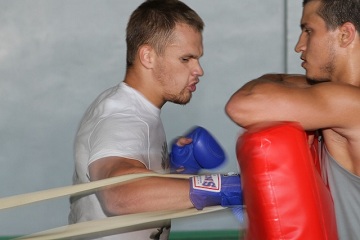
Q: You recently got married. Did it affect your preparation at all?
A: No, it did not affect my training. I am more ambitious and confident because of support of my family. I feel that I am on the right track and my efforts will bear fruit. I will be in my best condition and do everything to meet expectations of the people who believe in me.
Q: Who trains you in Yekaterinburg?
A: My best friends and my sparring partners, Lasha Gabaraev and Jamshed Ulfatov.
Q: You are a strong puncher. How did you practice punch with your partner also fighting in the All Japan?
A: I control in sparring but practice hard punches on bags or on a moving makiwara.
Q: In what strike do you believe the most?
A: I have confidence in my right low kick.
Q: What are your best results in weight training?
A: I'm not very fond of weightlifting. At the moment, my results are;
Bench Press - 130 kg, Leg press - 340 kg, Squat - 170 kg.
#113 Lechi Krubanov
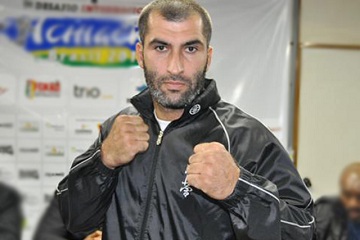
Q: How and where did you prepare
for the All Japan?
A: I trained in Moscow and trained very hard for it.
Q: Did your training and fight in kickboxing make any changes to your techniques?
A: I will see. I cannot say for sure but something must has changed.
Q: Many fighters breaks less boards in Tameshiwari recently. Your record of 31 boards stands out. Have the boards became stronger?
A: It requires special approach as each board can be slightly different but they are the same in general. I feel that breaking 31 boards or more is possible. I would like to try to break 35 boards. This will require special training but I have say that I am not interested in just breaking the boards.
Q: Which punch do you believe in the most, even when you're endlessly tired?
A: The punch which will come out automatically when its necessary.
Q: What is your longest training in sparring?
A: I had non-stop 100 sparring with 1 minute each in 2005.
Q: You lived and trained in Tokyo before, where is your favorite place?
A: Ikebukuro is my favorite place, and will remain so forever. My life in Japan begins there as well as for all foreign kyokushin practitioners.
Q: Many young fighters entered this All Japan. Can they be a threat for the experienced fighters?
A: I don't think so but they always have chance to defeat someone experienced. I think their main goal is to feel the atmosphere of the major tournament.

